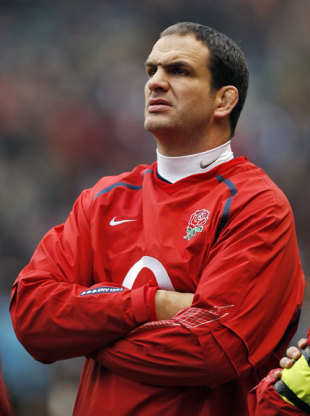|
England 6-32 New Zealand
Johnson's aura eradicated
Andrew Miller
November 29, 2008

Martin Johnson looks on as England slip to another defeat at Twickenham
© Getty Images
Enlarge
If it is Martin Johnson's intention to create an England rugby team in his own indomitable image, then for 60 minutes at Twickenham, it could be argued that his plan was coming, slowly but surely, to fruition. By rebounding from humiliation with a scratchy but gutsy display, England spared themselves the brickbats that followed last week's annihilation by South Africa, and gave their beetle-browed coach a semblance of solace to take into the fast-approaching Six Nations. And yet, in the final reckoning, England's limitations were laid horrifically bare. For the final quarter of their autumn campaign, there was no contest at all. Three unanswered tries and a final scoreline of 32-6 meant that England have now racked up their two most thumping home defeats on consecutive weekends, and on Monday, at the launch of the 2011 World Cup, their return to the ranks of the international also-rans will be rubber-stamped when they are stripped of their status as first-tier seeds for the draw. The scale of Johnson's task is abundantly clear, but at least the pretence has now been stripped away for good. The appointment of such a towering figure, whatever the sport may be, inevitably brings with it unrealistic expectations - whether it be Kevin Keegan's forays with England and Newcastle, or Greg Chappell's ill-fated stint at the helm of India's cricket team. Johnson, a World Cup legend and indisputably great as a player, left the international game in 2003 on the highest high imaginable. The ordinariness of this autumn's second coming may yet prove to be a blessing. Johnson's unease and embarrassment in the past weeks has been palpable. He checked himself in a recent BBC interview for using "empty words" as he tried to justify the scale of the thrashing his team was subjected to by South Africa, but at least he was able to look back on the All Blacks contest with a small degree of satisfaction. "We gave ourselves a chance but we were just not good enough to take it," he said. "Mentally the way the players approached the week was good, but if you make mistakes at this level, you get killed." And so it proved. New Zealand, in pursuit of only their third northern hemisphere Grand Slam, closed England down at every opportunity, building from the back with the sturdiness of a team that has not conceded a single try all autumn, and exploding through their opponent's defences at the merest hint of an opening. The unexpected fallibility of Dan Carter's place-kicking gave England a hope of staying in the contest, though his deftness from the hand was as sublime as ever, as Mils Muliaina latched onto a sweet dink into space on the right flank. Ultimately, however, England sealed their own downfall through their ill-discipline. The debate will rage about the exuberance of Alain Rolland's card-waving - four sin-binnings in what was by and large an even-tempered game seemed excessive, and Toby Flood in particular had a right to be aggrieved for a high tackle that was clumsy though hardly malicious. But even without the dismissals, England still conceded 19 penalties in the course of the match - or nearly one every four minutes.
Where once he led by example, now he can only watch from the sidelines - and wince at the bone-headed routes that his charges took to the cooler. There's no question that England lost because their discipline was ragged (whatever the contest, it cannot be wise to wind the referee up to quite the extent that they did). And yet, at least this match was a contest - at least for 60 minutes. Whether New Zealand were nonplussed by the disruptiveness of England's play, they were kept very quiet for lengthy periods of the game - which can only be an improvement on the sort of free-flowing slaughter that Carter and his colleagues are capable of handing out. "We made a very good attacking team look average at times," said Johnson, with a thinly-spread degree of pride. His team are currently lying in the gutter, but at least today they were gazing upwards, and reaching out - however cack-handedly - towards New Zealand's stars. © Scrum.com Andrew Miller is UK editor of Cricinfo
| |||||||||||||||
Live Sports
Communication error please reload the page.
-
Football
-
Cricket
-
Rugby
-
- Days
- Hrs
- Mins
- Secs
F1 - Abu Dhabi GP
Abu Dhabi Grand Prix December 11-131. Max Verstappen ()
2. Valtteri Bottas (Mercedes)
3. Lewis Hamilton (Mercedes)
4. Alexander Albon ()
5. Lando Norris ()
6. Carlos Sainz Jr ()
-
ESPNOtherLive >>
Golf - Houston Open
Snooker - China Open
Tennis - Miami Open

